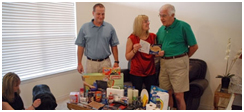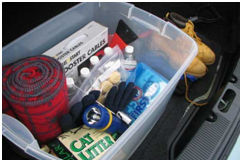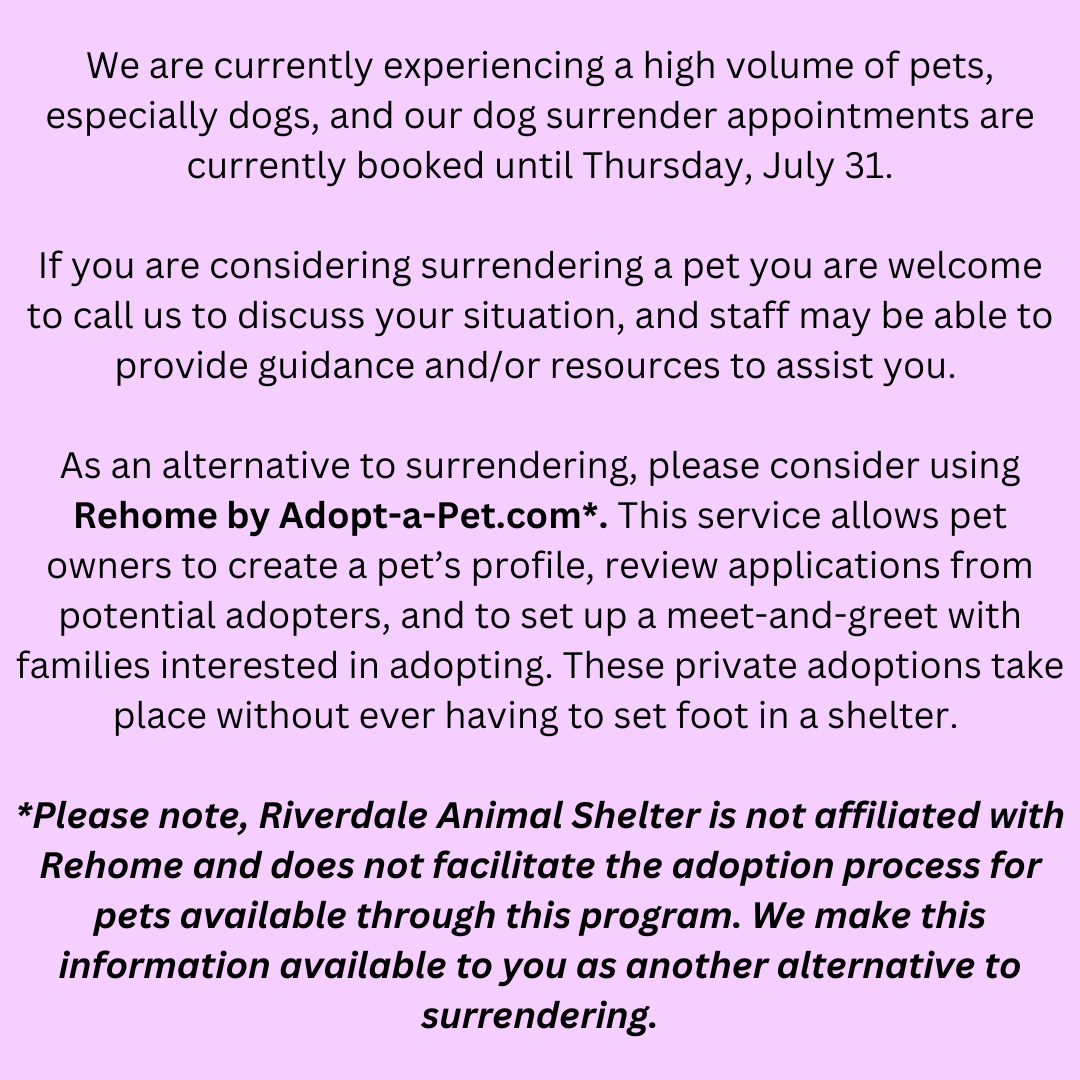An emergency supply kit also known as a 72 hour kit, can be instrumental in the safety and survival of your family when a disaster strikes. Your emergency kit should be kept in a safe, convenient place for your family to access. The six basics of a good kit include:
 Bottled water
Bottled water- Non-perishable foods
- First aid supplies
- Clothing and bedding
- Tools
- Special items: medication or necessities for kids or pets
Stored food and water should be rotated out every 6 months so it stays fresh, and you may need to reassess your kit every year or so as your family needs change (i.e. no longer needing diapers as your child ages). If possible, items should be kept in air-tight plastic bags. Keep the items you would most likely need in the event of an evacuation in a portable container such as a backpack, duffle bag or plastic bin.
 Car Kit
Car Kit
It is also a good idea to create a kit for your car, especially if you have a long daily commute. In the Winter Storm of 2006, motorists were stranded all over the Adams County area simply trying to complete their commute home. A car kit can be a life-saver. Also if you are traveling or vacationing in another area with hazards and changing conditions, such as in climate weather it is even more important to have weather specific items in your car kit.
Car Kits should include:
- Food and water
- Blankets, hand warmers, hat, rain poncho and gloves
- Flashlight, flares, and glowsticks
- Tools: Shovel, hammer, pliers, screw-drivers, multi-tool
- Jumper-cables, rope, small fire extinguisher
- First Aid kit, reflective vest
- Windshield wiper fluid and motor oil
- Phone book with important emergency numbers
- •Cash or change
Important Considerations
Emergency Supply Kits can be pieced together from items you can find at your local grocery and home improvement stores. Yet all of these items will take time and money to acquire. We recommend that larger families and those with tight budgets buy one or two items at a time and slowly piecing your kit together. At a minimum, focus collecting non-perishable foods, water, first aid supplies, and blankets.
Water
Water should be stored in plastic containers such as soft drink bottles. Avoid using containers that will break or decompose, such as milk cartons or glass bottles. A normally active person needs to drink at least two quarts of water each day. Hot environments and intense physical activity can double that amount. Children, nursing mothers, and people suffering with an illness will need more. Store one gallon of water per person per day. Keep at least a three-day supply of water per person (two quarts for drinking, two quarts for each person in your household for food preparation/sanitation).
Food
It is ideal to store at least a three-day supply of non-perishable food for you and your family. Select foods that require no refrigeration, preparation or cooking, and little to no water. Select food items that are compact and lightweight.
Include a selection of the following foods in your Disaster Supplies Kit:
- Ready-to-eat canned meats, fruits, and vegetables
- Canned juices, milk, soup (if powdered, store extra water)
- Staples — salt, sugar, pepper
- High energy foods — peanut butter, jelly, crackers, granola bars, trail mix, Vitamins
- Food for infants, elderly persons, or those with special diets
- Comfort/stress foods — cookies, hard candy, sweetened cereals, lollipops, instant coffee, tea bags
First Aid Kit
Assemble a first aid kit for your home and one for each car. A first aid kit should include:
- Sterile adhesive bandages in assorted sizes
- Assorted sizes of safety pins
- Cleansing agent/soap
- Latex gloves (2 pairs)
- Sunscreen
- 2-inch sterile gauze pads (4-6)
- 4-inch sterile gauze pads (4-6)
- •Triangular bandages (3)
Non-prescription drugs:
- Aspirin or non-aspirin pain reliever
- Anti-diarrhea medication
- Antacid for stomach upset
- Laxative
- 2-inch sterile roller bandages (3 rolls)
- 3-inch sterile roller bandages (3 rolls)
- Scissors
- Tweezers
- Needle
- Moist towelettes
- Antiseptic
- Tongue blades (2)
- Tube of petroleum jelly or other lubricant
Tools and Supplies
- Mess kits, or paper cups, plates, and plastic utensils
- Emergency preparedness manual
- Battery-operated radio and extra batteries
- Flashlight and extra batteries
- Cash or traveler’s checks, change
- Non-electric can opener, utility knife
- Fire extinguisher: small canister ABC type
- Tent or a large sized tarp
- Pliers
- Tape
- Compass
- Matches in a waterproof container
- Aluminum foil
- Plastic storage containers
- Signal flare
- Paper, pencil
- Needles, thread
- Medicine dropper
- Shut-off wrench, to turn off household gas and water
- Whistle
- Plastic sheeting
- Map of the area (for locating nearby shelters)
- Sanitation supplies
- Toilet paper, towelettes
- Soap, liquid detergent
- Personal hygiene items
- Plastic garbage bags, ties
- Plastic bucket with tight lid
- Disinfectant
- Household chlorine bleach
Clothing and Bedding
- Include at least one complete change of clothing and footwear per person:
- Sturdy shoes or work boots
- Rain gear
- Blankets or sleeping bags
- Hat and gloves
- Thermal underwear
- Sunglasses
Special Items
If you have family members with special requirements, such as infants, elderly or disabled persons, you may need to consider adding some or all of the following items to your kit.
For Babies
- Formula
- Diapers
- Bottles
- Powdered milk
- Medications
For Older Adults
- Heart and high blood pressure medication
- Insulin
- Prescription drugs
- Denture needs
- Contact lenses and supplies
- Extra eye glasses
For Pets
- Food
- Water
- Bowls
- First Aid kit
- Collar with ID Tag and leash
- Crate or pet carrier
- Important Paperwork: Inoculation records and photos
- Medications
- Familiar items or toys
Entertainment
- Games, Toys and Books
Important Documents
Keep these records in a waterproof, portable container.
- Will, insurance policies, contracts, deeds, stocks and bonds
- Passports, social security cards, immunization records
- Bank account numbers
- Credit card account numbers and companies
- Inventory of valuable household goods, important telephone numbers
- Family records (birth, marriage, death certificates)



